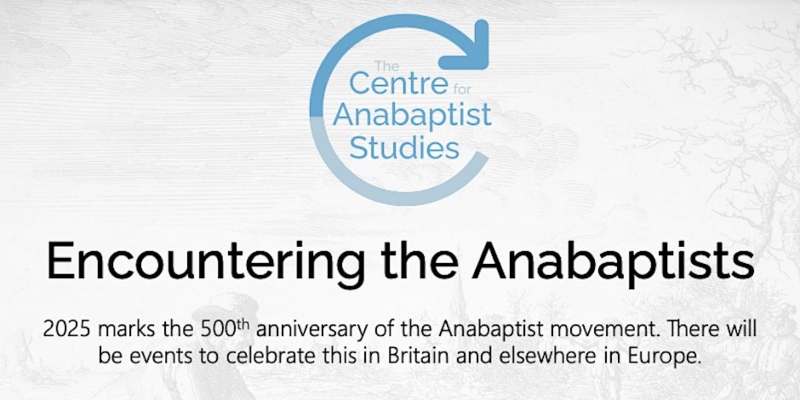Encountering the Anabaptists
Stuart Murray Williams outlines a short online course introducing a radical Christian movement that is inspiring and challenging many followers of Jesus today

The Anabaptist movement will celebrate its 500th anniversary in 2025. There will be various events to celebrate this in Britain and other parts of Europe in the next 18 months.
‘Encountering the Anabaptists’ is one small contribution – an opportunity to introduce the Anabaptist vision to a new generation.
The 16th century Anabaptist movement was:
-
A Jesus-centred movement that was committed to following him
-
A discipleship movement that took seriously the Sermon on the Mount
-
A church planting movement, pioneering fresh expressions of church
-
A multi-voiced movement that empowered its members, male and female
-
A peace movement that rejected violence and advocated religious liberty
-
A justice movement that practised radical economic sharing
-
A persecuted movement that suffered exile, imprisonment and execution
Anabaptists planted the first free churches of the modern era in Europe – free from state control, free from the state churches.
Anabaptists rejected the idea that the Bible was flat and any attempt to use the Old Testament to marginalise, ignore or explain away the teaching of Jesus.
Anabaptists rejected the Christendom system and the assumption that Europe was Christian, instead sending out hundreds of missionaries across Europe.
Anabaptists rejected compulsion in relation to faith and advocated liberty of conscience for all.
Anabaptists rejected infant baptism as unbiblical and pastorally damaging, instead baptising those who responded to the gospel and committed themselves to follow Jesus.
Anabaptists rejected the use of lethal violence in the judicial system and warfare, instead committing themselves to non-violence and peace-making.
Anabaptists rejected the swearing of oaths as contrary to Jesus’ explicit teaching, instead committing themselves to truth-telling in all circumstances.
So, it’s not surprising that the Anabaptists were persecuted by both Catholics and Protestants, who regarded them as a serious threat to church and state. There were hundreds of martyrs who were burned at the stake, beheaded or drowned. Eventually, this drove the movement underground or resulted in the migration of refugees seeking places of safety.
But the movement survived and is now global. In post-Christendom societies, where Christians are members of marginal church communities, the Anabaptist vision seems to have much to offer. And Christians from many denominations and traditions are discovering this.
Of course, it is tempting to idealise a movement that inspires us. The Anabaptists were far from perfect. In their search for a pure church of faithful disciples, they sometimes fell out with each other or became harshly critical. They realised that the Old Testament was being misused, but they weren’t sure what to do with it. Under pressure and torture they sometimes recanted and denied their faith – but many others remained faithful. And on occasions they grew impatient and tried to impose their convictions by force, betraying one of their core principles.
But there was something about many of them that impressed and puzzled their contemporaries. Franz Agricola, a Roman Catholic writer, expressed confusion about how these ‘heretics’ behaved: ‘As concerns their outward public life they are irreproachable. No lying, deception, swearing, strife, harsh language, no intemperate eating and drinking, no outward personal display, is found among them, but humility, patience, uprightness, neatness, honesty, temperance, straight-forwardness in such measure that one would suppose that they had the Holy Spirit of God!’
Agricola knew, of course that as ‘heretics’ they could not really be inspired by God’s Spirit, but he didn’t know how else to account for the way they lived.
Interested? Intrigued? Want to know more?
Why not spend four Wednesday evenings in November discovering more about this radical but neglected movement that birthed the Free Church Movement and is surprisingly relevant five centuries later.
The four evenings – 1, 8, 15 and 22 November – run from 7pm until 9pm. The course costs just £20 – and this includes a free copy of The Naked Anabaptist.
Dr Stuart Murray Williams is founding director of the Centre for Anabaptist Studies at Bristol Baptist College.
He is the author of The Naked Anabaptist - The Bare Essentials of a Radical Faith
Baptist Times, 12/09/2023